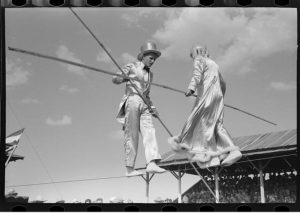 When I teach and ask my students about leaders one name never comes up: Ulysses S. Grant. I don’t think Grant’s tomb is a major tourists attraction in Manhattan. It certainty isn’t the case that all my years of teaching Grant isn’t thought of as a significant leader. Sometimes the time comes to reevaluate. We’ve reevaluated Eisenhower and Truman. Now it seems the time has come to reevaluate Grant.
When I teach and ask my students about leaders one name never comes up: Ulysses S. Grant. I don’t think Grant’s tomb is a major tourists attraction in Manhattan. It certainty isn’t the case that all my years of teaching Grant isn’t thought of as a significant leader. Sometimes the time comes to reevaluate. We’ve reevaluated Eisenhower and Truman. Now it seems the time has come to reevaluate Grant.
Joan Waugh, a Professor of History at UCLA has written thoughtful new book on the life of Ulysses S. Grant titled U.S. Grant: American Hero, American Myth. Professor Waugh seeks to explore the changing American attitudes towards Ulysses S. Grant, his presidnecy, and his leadership.
The outlines of Grant’s life remain fairly well known. Grant was the leading Union commander in the Civil War and the 18th president of the United States. Born in Ohio in humble circumstances, Grant reluctantly entered West Point at the insistence of his father. He served with distinction in the Mexican War but grew bored with the humdrum nature of Army life in peacetime. He resigned his commission in 1854, likely as a result of his problems with alcohol. He then had an undistinguished career in various civilian occupations until the outbreak of the Civil War.
Grant volunteered his services at the outset and rose from an obscure commander in the Western theater to win critical victories at Fort Donelson and Shiloh. In 1863, Grant captured the seemingly impregnable fortress of Vicksburg, dividing the Confederacy in two. Later that year, he won an impressive victory at Chattanooga. Grant became the first Lieutenant General since George Washington and ultimately defeated Robert E. Lee in a series of bruising battles in Virginia. But as a soldier, Grant may be best remembered for the generous peace terms he gave to Lee at Appomattox Court House in 1865.
Grant’s two terms as president (1869 — 1876) are generally regarded as less than distinguished. Grant attempted to implement Reconstruction but proved largely unsuccessful. His administration is remembered, somewhat unfairly, for the corruption of many of his associates. Although there has been an attempt to revise his reputation as president, Grant still routinely is listed at the bottom, with Harding and Buchanan, in various rankings of the American presidents.
Waugh combines a biography of Grant with a detailed study of the vicissitudes of his historical reputation. She tries to understand the reasons for Americans’ changing attitudes towards Grant. Through the end of the 19th Century, Grant was commonly regarded as part of a triumvirate of great Americans that included George Washington and Abraham Lincoln. Grant was regarded as the savior of the Union for his military victories and for the spirit of reconciliation he displayed at Appomattox. But for much of the 20th Century, Grant’s military reputation has frequently been denigrated in favor of that of Lee. More unfairly, Grant’s military skills have been ignored and his successes attributed to his alleged talents as a “butcher.” Grant’s reputation also suffered as a result of the failures of his presidency.
Waugh argues that it is time for Americans to revisit and reassess Grant. She writes “Perhaps now is the time for a new kind of tourist to the tomb … one more appreciative and knowledgeable. Never again will most citizens feel an uncomplicated pride in Grant’s achievements, or in what America has become since Appomattox, but there should be a realization that Grant’s goal of national reconciliation–as general and as president–included principles that are vitally important today: justice and equality for all…. No living person in the postwar era symbolized both the hopes and the lost dreams of the war more than Grant.” (Pg. 307) Indeed, it is high time we reevaluate Grant.



